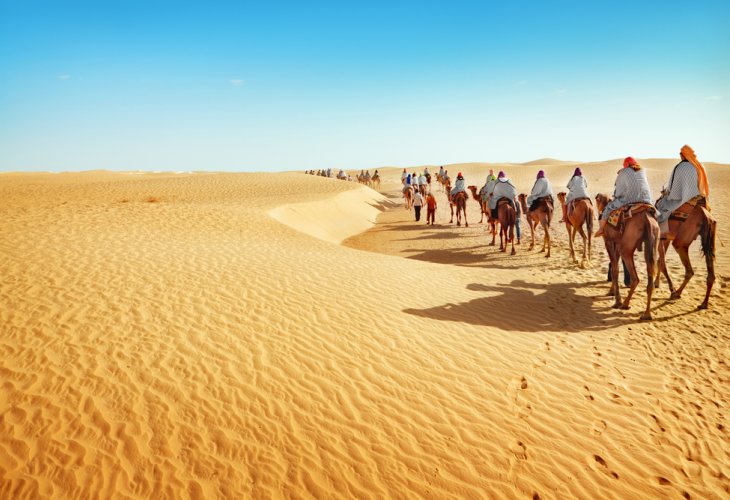Faith
Why Did Hashem Severely Punish the Generation of the Wilderness? Part 1
Understanding Miriam’s leprosy, the Golden Calf, the spies, and the deeper mercy behind God’s judgments in the wilderness
 (Photo: shutterstock)
(Photo: shutterstock)Rina asks: "Shalom, I was reading Parshat Behaalotecha and feel that Hashem deals very harshly with Israel. Miriam sinned and immediately became leprous; when they complained about not having meat, many people died. And not only there — I remember that after the sin of the Golden Calf, Hashem wanted to wipe out Israel, and later, because of the sin of the spies, He decreed that they would wander in the desert for 40 years. Could it really be that our Father in Heaven would destroy us in the wilderness after taking us out of Egypt? I find it difficult to understand Hashem’s ways, because they are so true, but also so sharp and painful — and we are only human. I’d appreciate any answer."
* * *
Shalom Rina, and thank you for your question.
In previous articles we discussed the outlook behind the Torah’s harsh rebukes, and now we’ll focus on some practical examples and try to understand them in their proper light.
We must first clear away a very serious misconception, that God would ever truly destroy His people in the wilderness, after all the great miracles and prophetic revelations He performed for them. Christianity and Islam, as you know, built much of their false faith on this very lie, ignoring explicit verses in the Torah.
This is a crucial point to know, because it provides the absolute refutation to all heretical claims: "And Hashem said to Moshe: Behold, you are about to lie down with your fathers, and this people will rise up and stray after the gods of the foreigners of the land into which they are going. They will forsake Me and break My covenant… Then My anger will flare, and I will hide My face… Many evils and troubles will befall them… And now write this song and teach it to the children of Israel… for it will not be forgotten from the mouth of their offspring… For I know their inclination, what they do even now, before I bring them into the land…" (Devarim 31).
God tells Moshe (Moses) in advance that the people will sin, and that because of their sins they will suffer many afflictions. Yet He declares that the Torah will never be forgotten by the Jewish nation: “for it will not be forgotten from the mouth of their offspring.”
Even after forsaking Him, provoking Him, and breaking the covenant, God promises eternal continuity: “for I know their inclination… before I bring them into the land.”
Moshe received this prophecy and told Israel: “Gather to me all your elders and officers… for I know that after my death you will surely act corruptly… and evil will befall you in the end of days” (Devarim 31).
All of the Jewish nation's future sins — in the wilderness and throughout history, even to the end of days, were foreseen by God before He chose them. Despite that, He revealed Himself at Sinai, gave them His Torah, and promised never to destroy them: “Yet even so, while they are in the land of their enemies, I will not reject them, nor will I loathe them to destroy them utterly and to break My covenant with them; for I am Hashem their God” (Vayikra 26:44).
Because God knows the future completely, His eternal choice of the Jewish People was never conditional. The threats of destruction in the desert (for example, after the Golden Calf or the spies) were not actual intentions to annihilate the nation, but rather a way of teaching the seriousness of sin and the greatness of Moshe’s intercession.
This principle completely refutes the mistaken notions spread by other religions and strengthens our own understanding of God’s eternal covenant.
The Sin of Miriam
There is extreme precision in the way God deals with His greatest prophets, because their reward in the World to Come is beyond anything this world can contain: “No eye has seen it, except for You, O God” (Yeshayahu 64:3).
Miriam was a great prophetess in Israel. Every action of hers served as Torah instruction, not only for her own generation but for thousands of years. Therefore, even the appearance of doubting Moshe’s unique prophetic level was very serious.
And yet, God acted with mercy. Although Miriam was stricken with leprosy to teach a lasting lesson, He gave Moshe the chance to pray for her, and she was healed. Her punishment lasted only seven days, during which she was not abandoned, but rather, she was honored: “And the people did not travel until Miriam was brought back” (Bamidbar 12:15).
Miriam's suffering purified her, enabling her to return to her former prophetic greatness. Far from being a disgrace, her story became an eternal merit — teaching the Jewish People for all generations the severity of lashon hara (evil speech), even when spoken with pure motives by a prophetess. Remembering Miriam is therefore one of the “Ten Remembrances” we are commanded to recall daily, as an everlasting merit for her soul.
In the next article, the final in this series, we’ll discuss the sin of the Golden Calf and the sin of the spies, and uncover the dimension of divine mercy even in the harsh judgments of the wilderness generation.

